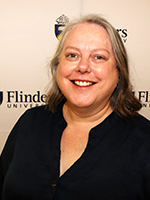
Our mission at the Research Centre for Palliative Care, Death, and Dying (RePaDD) is to make a difference to care at the end of life. We do this by examining the issues and challenges experienced by people living with a life-limiting illness, their carers, and the health and care professionals supporting them.
As 2023 nears its end, RePaDD reflects on the depth of research published by our researchers this year. We spoke to a few of our Members so they could have an opportunity to share insights of their research and to hear their perspectives on how they see their work advancing the knowledge and evidence in palliative care.
Learning Designers as Expert Evaluators of Usability

Speaking to Dr Amanda Adams (Research Fellow, Aged Care Research & Industry Innovation Australia (ARIIA); Early Career Researcher, RePaDD), she shared her insights into the publication, Learning Designers as Expert Evaluators of Usability: Understanding Their Potential Contribution to Improving the Universality of Interface Design for Health Resources, and how Learning Designers can generate meaningful feedback to shape digital health interfaces.
“Difficulty in developing palliative care digital resources within complex environments is compounded by the inability to access both representative end-users and usability experts to generate feedback when optimising user experience,” Dr Adams told RePaDD.
“Contextualised to University settings, the outcomes highlight potential advantages of involving Learning Designers in formative evaluation. With both technical skills and lived experience of death and dying, these design professionals provide valuable feedback for developers in lieu of patients, carers, or subject-matter experts.
“Further research is required to identify pathways to overcome institutionalised silos and operational barriers impeding the creation of truly multidisciplinary teams improving palliative care resources being designed for communities.”
Featured Publication:
- Adams A, Miller-Lewis L, Tieman J. Learning Designers as Expert Evaluators of Usability: Understanding Their Potential Contribution to Improving the Universality of Interface Design for Health Resources. Int J Environ Res Public Health. 2023 Mar 5;20(5):4608. doi: 10.3390/ijerph20054608.
The Intentional Pursuit of Everyday Life While Dying

Having completed her PhD with RePaDD and being awarded the VC Award for Doctoral Thesis Excellence by Flinders University in 2022, Dr Julie Brose (Senior Research Associate, University of Bristol and the National Institute of Health and Care Research Applied Research Collaboration West) her highlights on the phenomenological longitudinal study into the lived experience of occupational engagement for working-aged adults living with advanced cancer. In 2023, her study findings were published in the Australian Occupational Therapy Journal and in Palliative Medicine (selected as Editor’s Choice for September 2023).
“It has been such a privilege to talk to these people about the end of their lives and their experiences at such a difficult time. This work shows how important participating in everyday life is to people with advanced cancer,” Dr Brose shared with Flinders.
“Understanding the illness experience of those living with advanced cancer will help healthcare providers better understand what is important to them. Targeted care needs to go beyond symptom management, helping them prioritise participation in valued activities.
“Our findings highlight how insight into the experience of everyday life for working-aged adults living with advanced cancer can inform clinical practice and theory. Quality of life at end of life can be improved through everyday routines.”
Featured Publications:
- Brose JM, Willis E, Morgan DD. Occupational adaptation for adults living with advanced cancer: A phenomenological longitudinal study. Aust Occup Ther J. 2023 Oct 8. doi: 10.1111/1440-1630.12908. Epub ahead of print.
- Brose JM, Willis E, Morgan DD. The intentional pursuit of everyday life while dying: A longitudinal qualitative study of working-aged adults living with advanced cancer. Palliat Med. 2023 Sep;37(8):1210-1221. doi: 10.1177/02692163231180911. Epub 2023 Jun 13.
Managing Thirst and Dry Mouth in Palliative Care

RePaDD spoke to Dr Caroline Phelan (Lecturer, Ageing and End of Life; Course Coordinator, Postgraduate Palliative Care Programs; Co-Lead, End-of-Life Essentials), who took a novel approach to managing thirst and xerostomia (dry mouth) in palliative care, in collaboration with fellow RePaDD Members, Dr Peter Allcroft and Dr Muireann O’Loughlin. From this research, the team published two articles in the Journal of Pain and Symptom Management and shared their findings in a conference poster for the 2023 Oceanic Palliative Care Conference.
Speaking to RePaDD about the study, Dr Phelan explained: “Thirst is a common symptom experienced by people at the end of life, yet very little research is done to help us understand effective treatments. Research around dry mouth and thirst is undertaken in critical care areas or in the post operative setting but not commonly in palliative and end of life care.
“Our study tested the efficacy of an intervention originally trialled in a French ICU. We used mint cordial to make small ice cubes and tested if this relieved the sensation of dry mouth and thirst in patients at Laurel Hospice. The outcomes were very positive, and patients reported a preference for the mint ice over other forms of treatment.
“We have received more funding to expand the trial to other groups of patients, including those accessing rehabilitation services and those patients with MND. We have also been approached by palliative care services in NSW and Victoria who are interested in participating in our next study.”
Featured Publications:
- Phelan C, Hammond L, Thorpe C, Allcroft P, O’Loughlin M. A Novel Approach to Managing Thirst and Dry Mouth in Palliative Care: A Prospective Randomized Cross-Over Trial. J Pain Symptom Manage. 2023 Nov;66(5):587-594.e2. doi: 10.1016/j.jpainsymman.2023.08.005. Epub 2023 Aug 9.
- Hammond L, Chakraborty A, Thorpe C, O’Loughlin M, Allcroft P, Phelan C. Relieving Perception of Thirst and Xerostomia in Patients with Palliative and End-of-life Care Needs: A Rapid Review. J Pain Symptom Manage. 2023 Jul;66(1):e45-e68. doi: 10.1016/j.jpainsymman.2023.02.315. Epub 2023 Feb 23.
Death Doulas

With a keen focus on death doulas in end-of-life care, Deb Rawlings (Senior Lecturer, Palliative Care) led research into this emerging role, examining the views of death doula training organisations and the role’s engagement with bereaved family members.
“Our research into the non-medical Death Doula role, with three papers published this year, has increased in importance as Death Doulas are becoming part of the End-of-Life workforce,” said Ms Rawlings.
“Establishing an evidence base where there was none: this speaks directly to RePaDD’s aims in terms of advancing knowledge in this important area. However, the impact of the role has yet to be fully recognised or realised.”
Featured Publications:
- Rawlings D, Tieman J, Miller-Lewis L. ‘I’m very interested in learning more’: What health care professionals in the Dying2Learn Massive Open Online Course think of the death doula role. Progress in Palliative Care. 2023 Nov 26. doi: 10.1080/09699260.2023.2281113
- Rawlings D, Van Dinther K, Miller-Lewis L, Tieman J, Swetenham K. Experiences of engaging a death doula: qualitative interviews with bereaved family members. Palliat Care Soc Pract. 2023 Nov 8;17:26323524231207112. doi: 10.1177/26323524231207112.
- Rawlings D, Miller-Lewis L, Tieman J, Swetenham K. Death doula working practices and models of care: the views of death doula training organisations. BMC Palliat Care. 2023 Jun 23;22(1):78. doi: 10.1186/s12904-023-01200-w.

